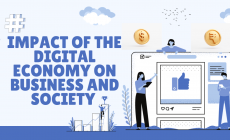-
UNION INTERIM BUDGET 2024-25 -
-
Are cryptocurrencies the future of the digital world economy -
-
Breaking Waves, Breaking News: Lakshadweep’s Recent Developments Explored -
-
The Impact of the Digital Economy on Business and Society -
-
Augmented Marketing: A Comprehensive Guide -
-
How To Strengthen Your Email Marketing Using AI -
-
How Artificial Intelligence and Digitization Are Transforming Our Lives -
-
What Data Science Tools do the Experts Recommend? -
-
Robotic Process Automation Will Transform Your Business? Check Here! -
-
Edge Computing: How it is Reshaping Cloud Infrastructure -
The Intersection of Technology and Digital Marketing
With the rise of technology, the world of digital marketing has undergone a big change in recent years. From the explosion of social media platforms to the use of artificial intelligence and machine learning, technology has opened up a whole new world of possibilities for marketers. In this blog, we will dive into the latest trends and strategies that are driving digital marketing success today.
Introduction: The Evolution of Digital Marketing
Since its inception, digital marketing has advanced significantly. It started with basic methods like email marketing, then moved to banner ads. From there, it evolved into social media marketing, mobile advertising, video marketing, and content marketing.
Influencer marketing and chatbot marketing are currently on the rise. The ultimate goal of digital marketing remains the same: to reach and engage with customers where they are spending their time online. But what has changed is the technology and channels available to reach this goal. With the rise of big data and artificial intelligence, marketers can now target consumers with the best accuracy, personalizing communications in a way never before possible. It’s an exciting time for digital marketers as they continue to evolve with new technologies that offer even more ways to connect with consumers on a deeper level than ever before.
The Role of Technology in Digital Marketing
Technology has changed the world of marketing, and digital marketing is no exception. It has become an integral part of modern marketing strategies, and its importance is hard to overemphasize. The use of technology has made it easier for businesses to reach and connect with their target audience, and it has also enhanced customer engagement.
1- One of the major benefits of technology in digital marketing is its ability to target specific demographics. Technology has made it possible for businesses to gather data about their target audience and optimize their campaigns for maximum effectiveness.
2- Technology has made it easier for businesses to create and distribute content. The internet has made it possible for businesses to reach a broader audience through various channels such as social media, email, and mobile devices. This allows businesses to capitalize on the potential of these channels by creating content that is engaging and relevant to their target audience.
3- Another crucial role that technology plays in digital marketing is in the measurement of campaign success. Digital marketing campaigns can be tracked using different analytical tools. These tools help businesses measure the effectiveness of their campaigns, identify areas for improvement, and make data-driven decisions.
4- Technology has made it possible for businesses to automate marketing processes, reducing the time taken to complete them. For instance, businesses can use chatbots to automate customer service and sales, which offers a convenient and efficient way for customers to make inquiries and receive support.
The Emerging Technologies in Digital Marketing
1- Virtual reality and Augmented reality: Virtual Reality (VR) and Augmented Reality (AR) technologies have become increasingly popular in recent years. They have given marketers a new way to engage with their audiences and provide them with immersive experiences. For example, IKEA’s VR experience lets customers virtually decorate a room and see how furniture would look in their homes. This not only helps customers make informed decisions but also enhances the customer experience and builds brand loyalty.
2- Artificial intelligence: Artificial intelligence (AI) is another emerging technology that is revolutionizing digital marketing. AI-powered chatbots are an excellent example of how AI can help brands scale customer support 24/7, provide quick responses to customer queries and increase customer satisfaction by resolving issues in real-time. Moreover, AI algorithms can help brands personalize their marketing efforts, recommending products and services to customers based on their behavior and preferences.
3- Voice search: Another emerging technology in digital marketing is voice search. With the rise of smart speaker devices like Amazon Echo and Google Home, voice search is becoming increasingly popular. Brands and businesses need to optimize their content, websites, and online presence to rank highly in voice search results with highly relevant and well-crafted content. This way, they can corner the market on consumer trust, since they are trusting Alexa, Siri, or Google Assistant to find the best results for them.
4- Blockchain: Blockchain, which is commonly associated with cryptocurrency, has a range of use cases beyond that. Blockchain technology is becoming increasingly important as a way for brands to build trust and transparency with their audiences. Its distributed nature allows data to be securely and transparently shared between different actors. This technology can help combat issues related to data privacy and trust among users.
Future of Digital Marketing: Trends and Predictions
Here are a few key trends and predictions for the coming years.
1- Firstly, artificial intelligence (AI) will continue to play an increasingly important role in digital marketing. With the ability to analyze data and provide customized content and recommendations to users, AI can help businesses to improve their targeting and personalize their marketing efforts. As AI continues to evolve and become more advanced, we can expect to see even more innovative uses of this technology in digital marketing.
2- The increase in video material is another important trend. With more and more people consuming video content on platforms like YouTube and TikTok, businesses are starting to recognize the value of incorporating video into their marketing strategies. From product demos to influencer partnerships, there are many ways that businesses can use video to engage with their target audience.
3- Social media is another area where we can expect to see continued growth and innovation in digital marketing. Platforms like Instagram and Pinterest have already become essential tools for businesses looking to reach younger audiences, and we can expect to see even more investment in social media marketing in the years ahead. Influencer marketing, in particular, is likely to continue to be a popular strategy for businesses looking to reach new audiences and build brand awareness.
4- As the COVID-19 pandemic continues to disrupt businesses and industries around the world, we can expect to see a continued focus on digital marketing as a way to reach customers and drive sales. With many consumers now shopping online more than ever before, businesses that can effectively use digital marketing strategies are likely to come out ahead in the coming years.
Conclusion
The world of digital marketing is constantly changing, and businesses must stay on top of the latest trends and predictions to stay competitive. From the rise of AI and video content to the continued focus on social media and the importance of digital marketing in the wake of the COVID-19 pandemic, many factors will shape the future of this dynamic field in the years ahead. By staying on top of these trends and investing in innovative digital marketing strategies, businesses can position themselves for success in the digital age.































